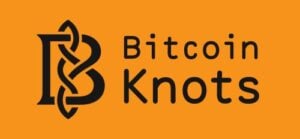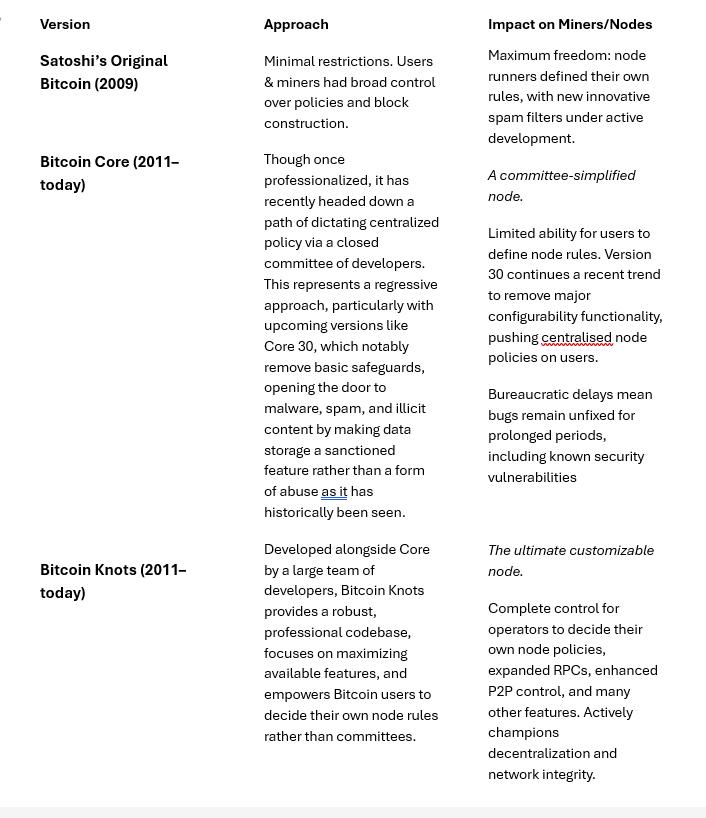
In an era where Bitcoin Core tries to dictate centralized policies, actively jeopardizing network integrity with an influx of data spam and junk, Knots takes the only responsible stance: your node, your rules. The choice is no longer about preference; it’s about survival and competitive advantage. Knots also provides sane defaults that prioritize network health and stability, offering a reliable foundation for users who may be hesitant to dive deep into customization immediately.
The difference is stark:
Bitcoin Core operates on a rigid, limited framework: its design philosophy restricts user choice and actively hinders the ability to filter out unwanted network traffic. This leads to demonstrable inefficiency, vulnerability, and outright neglect of the network’s long-term health. The actions of its maintainers, particularly concerning upcoming releases, demonstrate a shocking lack of professional responsibility and foresight. For every user, Core’s dictates are not merely defaults but actively prevent any meaningful control.
Bitcoin Knots is the fully customizable, high-performance system essential for the modern Bitcoin economy: with precise controls and powerful features, it offers exact command over network traffic and the integrity of your Bitcoin operations. Knots is engineered for the future, providing the agility and resilience demanded by serious Bitcoin participants.
Every Bitcoin user, from individual enthusiasts to enterprise-level operations, now critically needs this precise command. It means the power to manage your Bitcoin operations exactly as you need, with absolute control over the transactions you relay and mine. Knots provides extensive P2P controls and robust features, ensuring that your operational strategy is defined by you, not dictated by an oligarchy.
This release comes as Bitcoin Knots’ market share explodes. Knots now powers 18% of all public nodes, a staggering increase from its prior 2% just months ago. This trajectory is undeniable and accelerating, with the previous version of Knots representing 53% of updated nodes, demonstrating a decisive shift away from Core among those actively managing their Bitcoin infrastructure.
This overwhelming growth is not accidental; it is a clear mandate from the market. It signals that Bitcoin users are unequivocally aligning with sovereignty remaining with the node owner and not a rogue clique of developers who prioritize their agenda over network health. The industry now demands true decentralization, customization, precision, and operational freedom—values that have always been central to Bitcoin’s ethos of decentralization and are now exclusively championed by Knots. Rather than challenging the status quo, Knots is restoring it by maintaining user sovereignty and network health while Core abandons it for a new direction of selling users out for scams.
Bitcoin’s software has evolved, but this evolution is being marred by a critical deviation from Satoshi’s original principles of user empowerment.

Knots represents a decisive return to Bitcoin’s original ethos: decentralization not only across the network, but fundamentally within each Bitcoin user’s ability to control their infrastructure.
Bitcoin Knots v29.1 release is a continued pledge that, for all miners and node operators:
Control and flexibility matter, and Knots delivers them without compromise.
Robust spam filtering is essential, and Knots ensures the network remains functional.
Sovereignty is the path to survival, and Knots ensures your operational independence.
In a competitive digital environment, where efficiency, security, and absolute control are paramount, Knots ensures that Bitcoin users are not locked into a shrinking set of dictates from Bitcoin Core. Instead, they are empowered to run their nodes their way, securing their operations and the network itself against the growing threats of congestion and manipulation. Make the strategic choice for ultimate control. Join the shift to Knots.
Bitcoin Knots is the superior Bitcoin node implementation that enhances flexibility, restores configurability, and empowers Bitcoin users to maintain absolute control over their infrastructure. With Knots, you’re not locked into defaults, you’re free to run Bitcoin your way. Knots provides sane defaults with network health in mind, ensuring a functional and secure experience even for those who prefer less hands-on control. Your node, your way. Your future, secured by Knots.
Learn more at www.bitcoinknots.org and review the latest release notes on GitHub:
Media Contacts:
Luke Dashjr